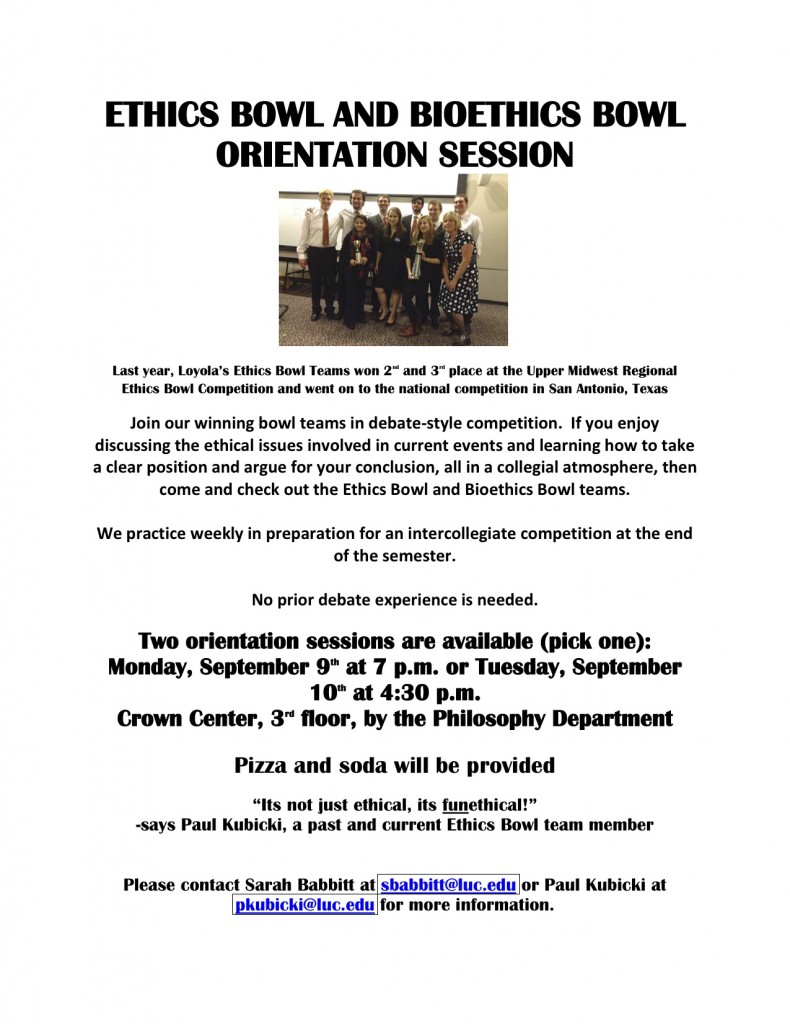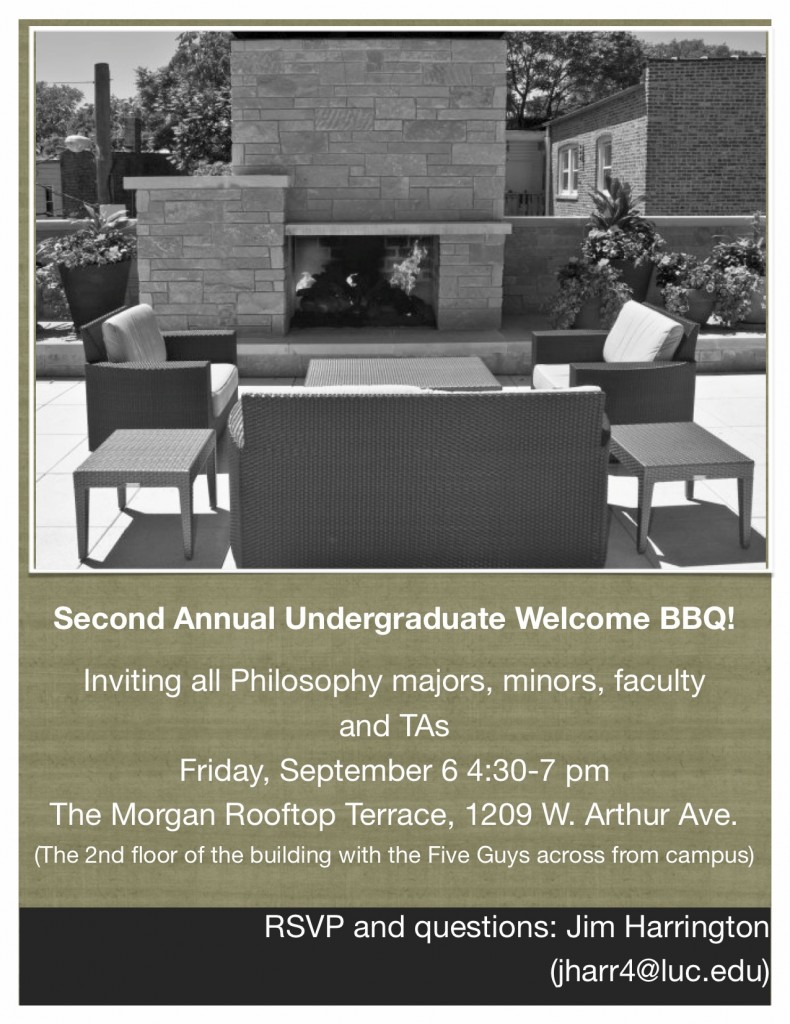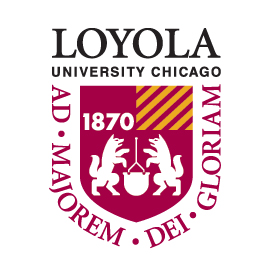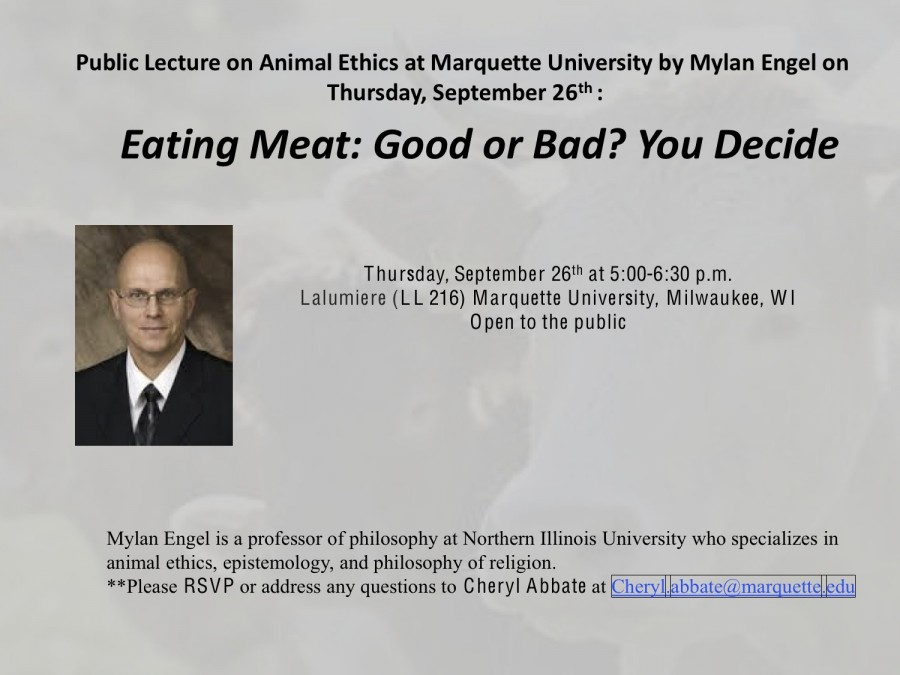
Author Archives: Sarah Babbitt
CFP: [Extended Deadline] 2014 IEEE International Symposium on Ethics in Engineering, Science, and Technology, Ethics’2014
| 2014 IEEE International Symposium on Ethics in Engineering, Science, and Technology, Ethics’2014
Friday-Saturday, 23-24 May, 2014 Chicago Marriott O’Hare, Chicago, IL, USA |
http://sites.ieee.org/ethics-conference/
| Ethics – A Challenge to the Scientific and Engineering Community | |
| Second Announcement and Call for Papers – Deadline Extended | |
| With the evolution of science, technology and engineering, ethical problems often arise. Ethics and ethical conduct have become a critical issue in the 21st Century. |
| Scientists, technologists and engineers of all ages, students as well as senior professionals, encounter ethical challenges in their professional and personal lives. Often, an answer to such challenges arises from brainstorming sessions and intense discussions. Are ethics and morals the same? Are ethics and laws consistent? Could professional ethics in one discipline conflict with ethical conduct of another discipline? Should ethics be sacrificed for global “competitiveness”? |
| Furthermore, ethical conduct has global and cultural perspectives. Could unethical conduct in one culture be acceptable in another? What is the difference between ethics and codes of conduct? Are there principles that could be considered as valid through all cultures? Could we claim that the fundamental bases of ethics are independent of our origins?
With all these questions (and many others) in mind, we are delighted to announce that the first IEEE International Symposium on Ethics in Engineering, Science, Technology (IEEE Ethics 2014)
The IEEE Ethics 2014 Symposium aims to respond to the needs and aspirations of a rising global professional community and to promote highest standards of ethical conduct among its members.
The Symposium will offer a rich scientific program of highest quality with invited speakers from all over the world and intends to bring together scientists, engineers, ethicists and practitioners from different disciplines to discuss questions and concerns related to ethics in science, technology, and engineering. Issues will be explored both from a scientific point of view and from a social or individual aspect, including global, multicultural perspectives. The Symposium will enable participants to debate and reflect on issues facing scientists and engineers, and to address the importance of ethics in a diverse scientific and professional global community. Scientists, engineers and other professionals who have relevant experience to be shared are encouraged to participate in the Symposium which will provide a platform for exchange of views in three different formats: formal presentations, panel discussions, and small group discussions.
Workshops, tutorials, “Birds-of-a-Feather” provokquium panels and special invited sessions will be organized on stimulating topics. The Symposium will be accompanied by an exhibition.
The Theme of the Symposium is: “Ethics AND…”
Ethics isn’t practiced in a vacuum. At this symposium, we want to put ethics into different perspectives, put ethics to work in different contexts, and look at ethics from different vantage points. To that end, each of our tracks is labeled ‘Ethics and… X.’ We hope that you will find several of these X’s particularly interesting.
For the latest information, please visit our web site at: http://sites.ieee.org/ethics-conference/
Prospective authors are invited to submit original, unpublished papers on their latest research results covering all aspects of Ethics in Science, Technology and Engineering.
We also solicit proposals for special paper sessions, panels, workshops and tutorials. Workshops and tutorials provide fundamental exposure to topics ranging from introductory through intermediate to advanced levels. They will be presented in two-to-three hour in-depth sessions at the Symposium.
Join us in the vibrant city of Chicago, IL, where you can combine “business with pleasure,” share your insight, ask questions and learn from the experts/innovators at the IEEE Ethics 2014 Symposium. Your published paper will be seen by thousands in the professional community and across the wide array of disciplines. In addition, all papers presented at IEEE Ethics 2014 Symposium will be submitted to IEEEXplore with unlimited exposure.
We invite you to take this opportunity to share your research – theoretical, practical and case studies. Plan to submit your paper proposal now.
Prospective authors are invited to submit original, unpublished English-language abstracts and session proposals. PDF format is preferred for all submissions.
Authors’ and Session Proposers’ Submission guidelines and Schedule – SUBMISSION DEADLINE EXTENDED
Please check the Symposium website, http://sites.ieee.org/ethics-conference/ for detailed Authors’ Instructions on submitting paper and poster abstracts and proposals for special paper sessions, panel sessions, open forums, workshops, and tutorials, and for templates for the Final Paper Manuscripts. § Abstracts for individual papers (500 words), Posters (500 words), Special Paper Session Proposals, Panel proposals, Tutorial proposals, and Workshop proposals are due by October 15, 2013 § Notification of Acceptance: November 30, 2013 § Final Paper Manuscripts for the Symposium Proceedings: January 12, 2014
|
Lecture: “Habits of the Heart: East and West,” Dr. Richard Madsen, LUC, Oct 4
Dr. Richard Madsen will be exploring themes similar to those presented in the influential Habits of the Heart but with new insights from his recent research focusing on the values shaping contemporary Chinese society.
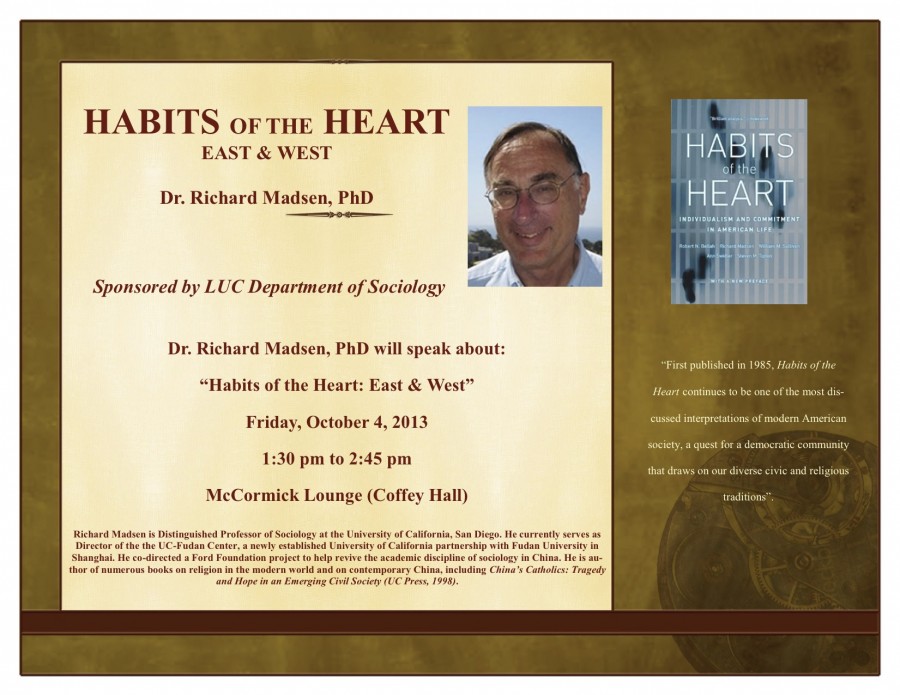
CFP: EPTC 2014: Existential & Phenomenological Theory & Culture
Brock University, St. Catharines, Ontario, Canada
The society for Existential and Phenomenological Theory and Culture (EPTC) invites papers discussing any aspects of existential or phenomenological theory or culture. For example, papers dealing with theoretical or cultural issues in relation to authors such as Kierkegaard, Nietzsche, Dostoyevsky, Kafka, Beckett, Husserl, Heidegger, Jaspers, Levinas, Malraux, Marcel, Buber, Frankl, Beauvoir, Sartre, Camus, Merleau-Ponty, Irigaray, or Laing are all welcome. Submissions from all disciplines are welcome. EPTC will meet at Brock University in St. Catharines, Ontario, Canada onMay 27-30, 2014, in conjunction with the Congress of the Social Sciences and Humanities of Canada. Our keynote speaker this year will be Christine Daigle.
Interested authors should submit the following electronically in .doc, .docx, or .rtf format:
1. The paper, not more than 4500 words, and prepared for anonymous review (identifiable by paper title only).
2. A separate abstract, not more than 100 words, also listing the paper’s title, author’s name, institutional affiliation, and e-mail address.
If you are interested in either presenting a commentary (of not more than 1000 words) on a paper, or chairing a session, please submit a brief e-mail note indicating as much, including your name, institutional affiliation, e-mail address, and relevant areas of interest.
EPTC is able to waive Congress fees for a few delegates each year. Such awards will be made according to criteria of financial need and quality of paper at the discretion of the conference program coordinator. Non-tenure-stream delegates interested in this award should append a note indicating as much to their submission materials.
The submission deadline for the above materials is January 15, 2014.
Submissions should be sent to: eptctcep@gmail.com
For more information on EPTC, see: http://eptc-tcep.net
CFP: The Society for Philosophy in the Contemporary World: Oppression, Autonomy, and Biomedical Ethics
The Society for Philosophy in the Contemporary World (SPCW) invites abstracts for 30-minute talks/papers to be given at the Pacific APA in San Diego, April 2014 on topics related to oppression, autonomy and biomedical ethics. Send your abstract (or questions) to Tim Christie (twchrist@mail.ubc.ca) with the subject heading “2014 Pacific APA”. Deadline: September 30.
CFP: Transatlantic Research Group: “Sexuality, Human Rights and Public Policy”
This conference draws on a broad range of academic fields—including anthropology, sociology, political philosophy, history, political science, and cultural studies—to investigate the dynamics of public policy, human rights, and sexuality as they relate to inclusion and exclusion globally.
Panels, papers, creative presentations, and roundtables that employ diverse, interdisciplinary and inter-generational perspectives are especially welcome in these areas:
Public policy, Law and Sexuality
Human body, Gender and Sexuality
Culture, Identity and Sexuality
Religion, Culture, and Sexuality
Christianity and Sexuality
Islam and Sexuality
Social Media and Sexuality
Sexual Orientation, Sexual/Gender Identity
Sexuality and Reproductive Rights
Human Body and Cultural Meanings
Human body, Stereotypes and Sexualities
Homosexuality, Homophobia, and Violence
The Female Body and Gender-based Violence
Heterosexuality and “Other” Sexuality
Abstracts should be around 300 words and include the paper title and the name and contact details of the presenter. Abstracts should be submitted by October 25, 2013. If an abstract is accepted for the conference, a full draft paper should be submitted by Monday January 20, 2014.
Please send abstracts and papers to Chima Korieh, Marquette University: chima.korieh@marquette.edu
The department wants to put together a newsletter about you. Help them out!
Hello Current & Former Grad students,
The department is putting together a congratulatory email celebrating any major life events (marriages, babies, new jobs, etc.) that have occurred since Spring of this year. If you have any information to include in our email, please feel free to send it my way so we may add it and share it with other graduate students and faculty.
Thank you,
Molly Clasen
Office Assistant
Philosophy Department
Loyola University Chicago
Crown Center 381
1032 West Sheridan Road
Chicago, IL 60660
Phone: 773.508.2453
Fax: 773.508.2292
E-Mail: mclasen@luc.edu
CFP: Logos 2014: The Atonement
Call for Papers
Logos 2014: The Atonement
May 8-10, 2014 at the University of Notre Dame
The focal point of the Christian religion is what is often referred to as “the Christ event”—an event that includes the incarnation of the second person of the Trinity in Jesus of Nazareth, as well as his life, death, burial, resurrection, and ascension into heaven. The atonement is a crucial part of this event. But, despite the absolute centrality of the atonement to Christian faith and practice, there are widely divergent theories about just which events constitute the atonement, about what exactly is accomplished in the atonement, and about how the events that constitute the atonement contribute to human salvation (whatever exactly that encompasses) and to whatever other ends were achieved by the atoning work of Christ. These and related issues (e.g., about the nature of atonement, reconciliation, and forgiveness in general) comprise the topic for the 2014 Logos Workshop in Philosophical Theology.
To have your paper considered for presentation at Logos 2014, please submit an abstract of the paper or the paper itself no later than October 15, 2013. Other things being equal, preference will be given to those who submit full papers by the deadline. We will let you know by December 1, 2013 whether your paper has been provisionally accepted. Full acceptance will be conditional on submission of the full reading version of the paper by April 1, 2014.
Please send Abstracts or Full Papers to: analytictheology.logos@gmail.com
For more information, please visit: http://philreligion.nd.edu/calendar/annual-logos-workshop/
California Roundtable on Philosophy and Race, 2013: Program Schedule and Updated Website, DePaul, Oct.10-12
If any of you are interested in philosophy of race, the California Roundtable for Philosophy of Race is holding its 10th anniversary meeting at DePaul this year. The program is below and at www.caroundtable.webs.com.
California Roundtable on Philosophy & Race
October 10th-12th, 2013
Chicago, Illinois
Thursday October 10th
2:30 p.m.-3:00 p.m.: Coffee/Welcome
Session I: 3:00-5:00 p.m.
Moderator: Lisa McLeod, Guilford College
3:00 p.m.: Renisa Mawani, University of British Columbia
“Atmospheric Pressures: On Race and Affect”
4:00 p.m.: Stephanie Rivera-Berruz, University of Buffalo
“The Gaze Returned: Boomerang Perception Thrown Through Racial Realism”
5:00-5:30 p.m.: Break
5:30-6:00 p.m.: Introductory Remarks
Reception
Friday October 11th
9:00-9:30 a.m.: Coffee/Light Breakfast
Session II: 9:30 a.m.-12:30 p.m.
Moderator: Ernesto Rosen Velasquez, University of Dayton
9:30 am: Sybol Cook Anderson, St. Mary’s College of Maryland
“The Imperative of Post-Racialism: Ending the Racial Paradigm”
10:30 am: Alia Al-Saji, McGill University
“A Phenomenology of Hesitation: Interrupting Racializing Habits of Perception”
11:30 a.m.: Sophie Guérard de Latour, EHSS, Paris
“Multiculturalism and Anti-Racism, Allies or Enemies? Assessing the ‘Strategy of Des-ethnicization’ in Critical Republicanism”
Lunch: 12:30 to 2:00 p.m.
Session III: 2:00-4:00 p.m.
Moderator: Janine Jones, University of North Carolina, Greensboro
2:00 p.m.: Shannon Sullivan, Pennsylvania State University
“The Hearts and Guts of White People: Ignorance and the Physiology of White Racism”
3:00 p.m.: Andrew Pierce, Sacred Heart University
“The Myth of the White Minority”
Break: 4:00-4:30 p.m.
Keynote: 4:30-6:00 p.m.
Lucius Outlaw, Vanderbilt University
Moderator: Darrell Moore, DePaul University
Keynote Reception: 6:00-7:30 pm
Saturday, October 12th:
9:30-10:30 a.m.: Coffee/Light Breakfast
Session IV: 10:00 a.m.-12 p.m.
Moderator: Lawrence Blum, University of Massachusetts, Boston
10:00 a.m.: Grant Silva, Marquette University
“The Colonial and Racial Dimensions of Immigration: Why No One Has a Problem With Legal Immigration”
11:00 a.m.: Eddy Souffrant, University of North Carolina, Charlotte
“The Challenge of Universal Freedom: Douglass in Haiti”
Lunch: Noon-1:30 p.m.
Session V: 1:30-4:30 p.m.
Moderator: Michael Monahan, Marquette University
1:30 p.m. Megan Mitchell, UNC Chapel Hill
”‘Everything’s a Little Bit Racist:’ An Account of Implicit Racial Bias as Institutional Racism”
2:30 p.m.: Joseph Smith, Southern Illinois University, Carbondale, “The Niggarization of Black Bodies”
3:30-3:45 Break
3:45 p.m.: Kristin McCartney, Oakton Community College, “This Bridge…: On Reading Lesbian Contexts as Philosophers of Race”
Break: 4:45-5:00 p.m.
Session VI: 5:00-6:30 p.m., Roundtable on the Roundtable
Closing Reception: 6:30-7:30 p.m.
The Organizers of the CRPR
Darrell Moore, Depaul University
Mickaella Perina, UMass Boston
Falguni A. Sheth, Hampshire College
Congratulations, Alberto!
Dr. Alberto Bertozzi has been selected by the Graduate School as Loyola’s nominee for the Council of Graduate Studies/ProQuest Distinguished Dissertation Award in the Humanities/Fine Arts category.
Alberto defended his dissertation with distinction in 2012:
On Eros in Plotinus: Attempt at a Systematic Reconstruction (with a Preliminary Chapter on Plato)
Director: Dr. Adriaan T. Peperzak
Congratulations to Alberto and thanks to all who wrote nominating letters.
Message from Dr. Vicki Wike
Welcome, new Loyolans! Let’s eat!
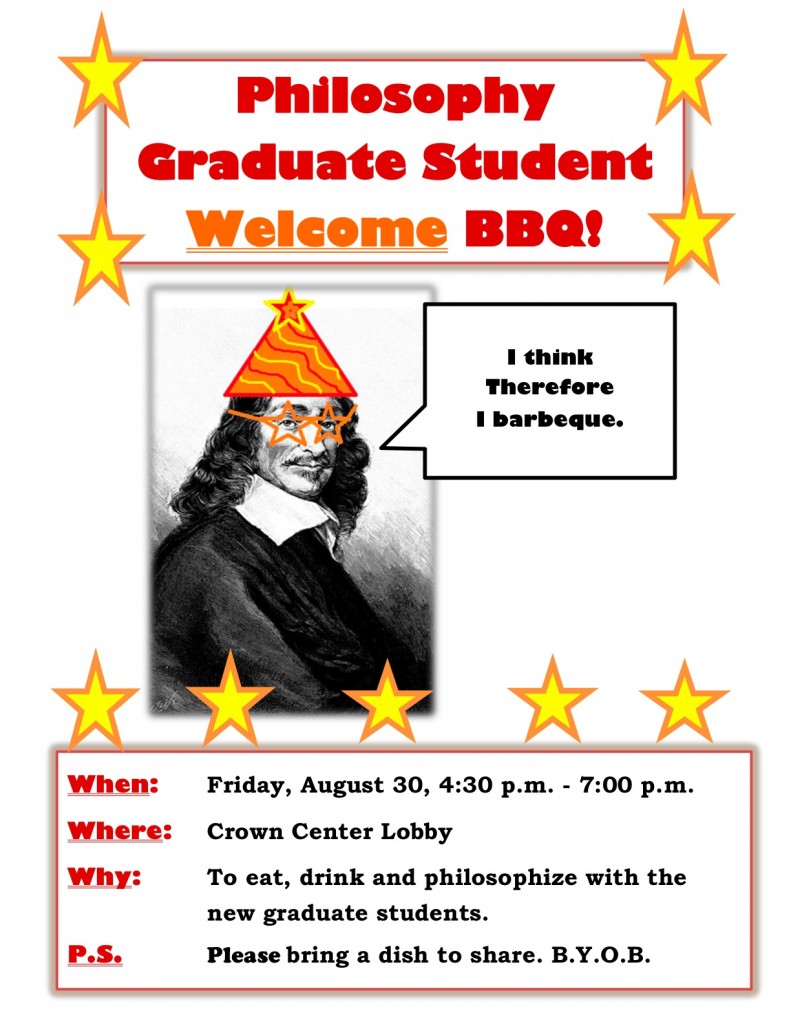
Note: For those who acknowledge a distinction, there will be no actual barbeque; we will be grilling out. I, for the record, am accustomed to using “BBQ” and endorse the above usage.
Original artwork by Molly Clasen.
CFP and Essay Prize: Moral Nonnaturalism

Events, 2013-14: Theology and Ecology
‘Theology and Ecology’ Event Planning for AY 13-14
Fall Semester
1. Oct. 4
Screening of James Balog film “Chasing Ice” and Post-Screening Panel Discussion
Panel: William French (Theo), Michael Agliardo, S.J. (Soc), Martin Berg (Biol)
7:00-9:00pm, Damen Theater, LSC
LUC’s participation in the nationwide Catholic Climate Coalition program “Melting Ice, Mending Creation: a Catholic Approach to Climate Change.” Organized by the LUC Office of Sustainability.
2. Oct. 15
Presentation by Pulitzer Prize Winning Environmental Journalist Bob Marshall
Screening of Elizabeth Coffman/Ted Hardin film “Veins in the Gulf”
4th Floor IC (times being determined)
Panel Discussion: interested faculty
The focus of the event is on exploring how the overlapping themes of journalism,
ecology, and religion impact the narrative ‘reading’ of catastrophic storm events and
environmental disasters (in this case, those in the Gulf of Mexico).
Organized by the School of Communication, Institute of Environmental Sustainability, and the Department of Theology
3. Nov. 14-15
Conference: US Energy and Environment: Science, Ethics, and Public Policy
Nov. 14 7:00pm Keynote Lecture: Filmmaker James Balog
Nov. 15 9:15am Presentation on Energy and Climate Change (speaker TBA)
11:15am Dr. Emmanuel Agius
Presentation on Energy Policy from a European Perspective
2:00pm Panel: Science, Ethics, and Energy Policy
Dr. Howard Learner
Dr. Donald Wuebbels
Dr. Jame Schaefer
Organized by the Department of Theology and the Institute of Environmental Sustainability
